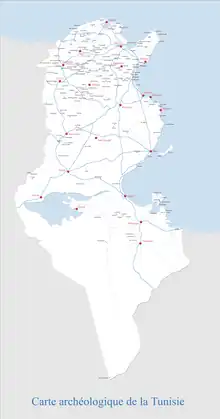Bilta
Bilta also known as Balta or Balţah, is an antique town in northern Tunisia, close to Mateur in today's Bizerte governorate. Its name comes from the Numidian language (Lybico-Berber) root BLT, meaning, filled with water.[1]
Bilta
Baltha, Bilthensis | |
|---|---|
| Henchir Bahaia | |
| Country | |
| Time zone | UTC+1 (CET) |

An inscription in the nearby fundus Aufidianus contains the name of the place: Agricolae in spl(endida) (vel spl(endidissima)/re p(ublica) Bihensi Bilt[a](vel Belt[a])[2].
During Vandal and Byzantine times, bishops are attested: in 256 AD, a Caecilius is episcopus in Bilta (or Biltha, or Belta), in 411, a donatist named Felicianus is in Viltensis[1] and in 646, a bishop Theodorus in Biltensis signs a letter sent to the Lateran Council of 649.[3]
The town is a titular see of the Roman Catholic church.[4]
It is not to be mistaken for the modern town of Balta-Bou Aouene in the Jendouba governorate.[1]
References
- Peyras, J. (1991-12-01). "Biha Bilta". Encyclopédie berbère (in French) (10): 1494–1516. doi:10.4000/encyclopedieberbere.1755. ISSN 1015-7344.
- Peyras, Jean (1975). "Le Fundus aufidianus : étude d'un grand domaine romain de la région de Mateur (Tunisie du Nord)". Antiquités africaines (in French). 9 (1): 181–222. doi:10.3406/antaf.1975.978.
- "I PBE: Theodoros 340". www.pbe.kcl.ac.uk. Retrieved 2023-01-18.
- Cheney, D. M., Bilta (Titular See), The Hierarchy of the Catholic Church, accessed 30 October 2022